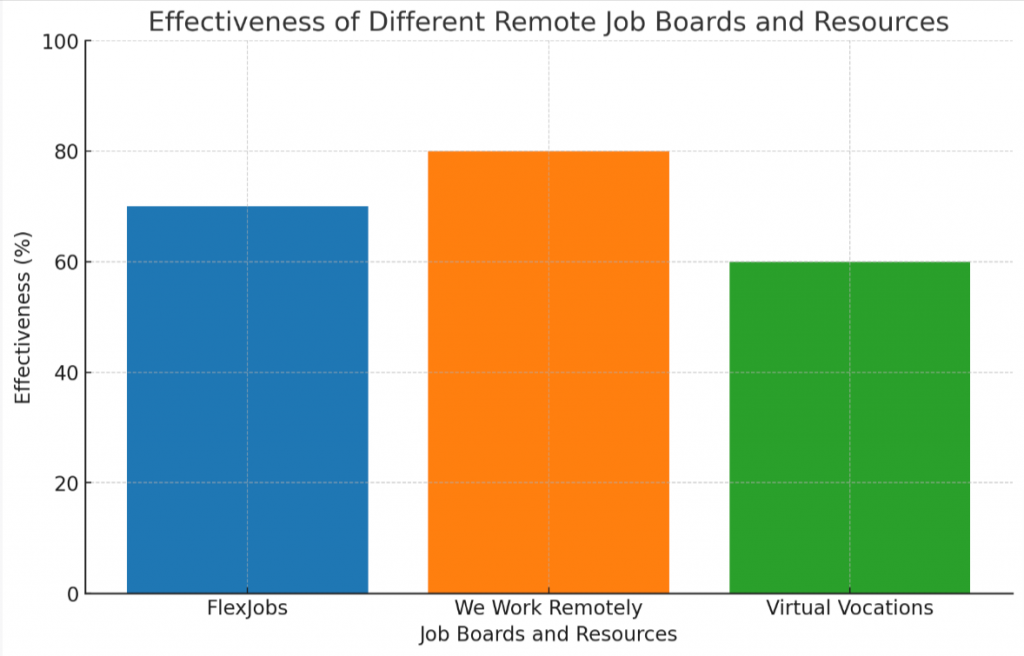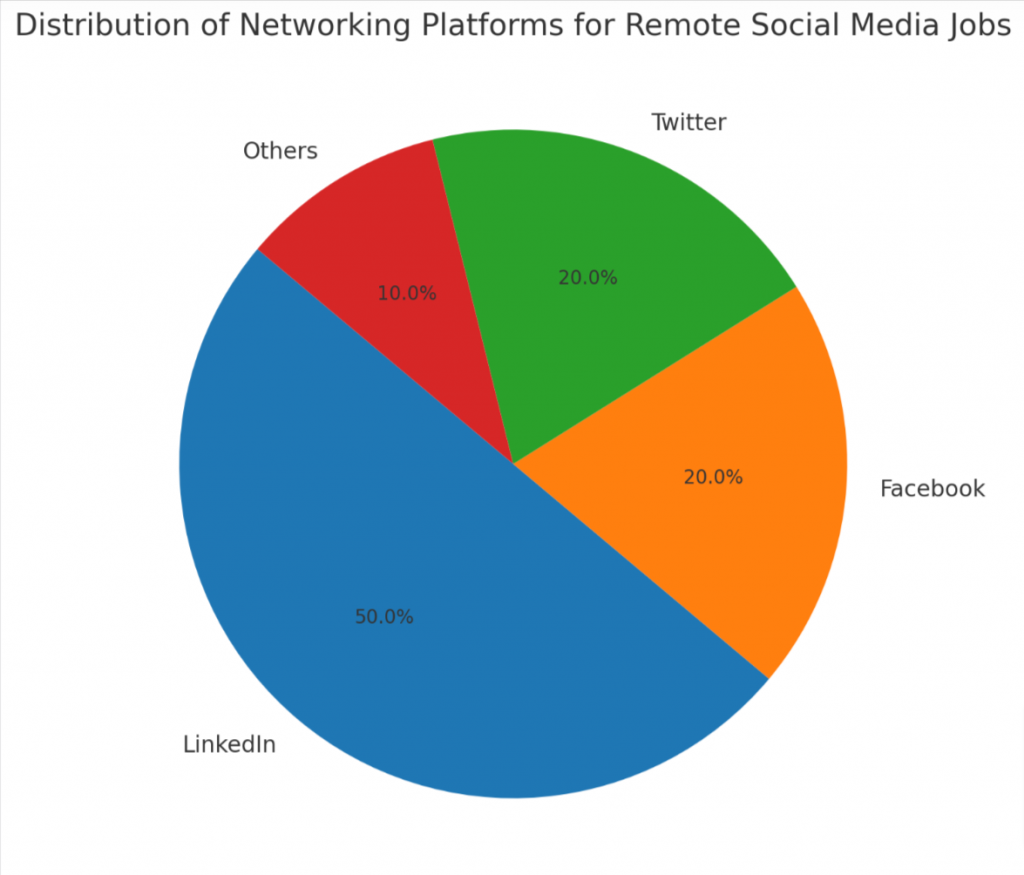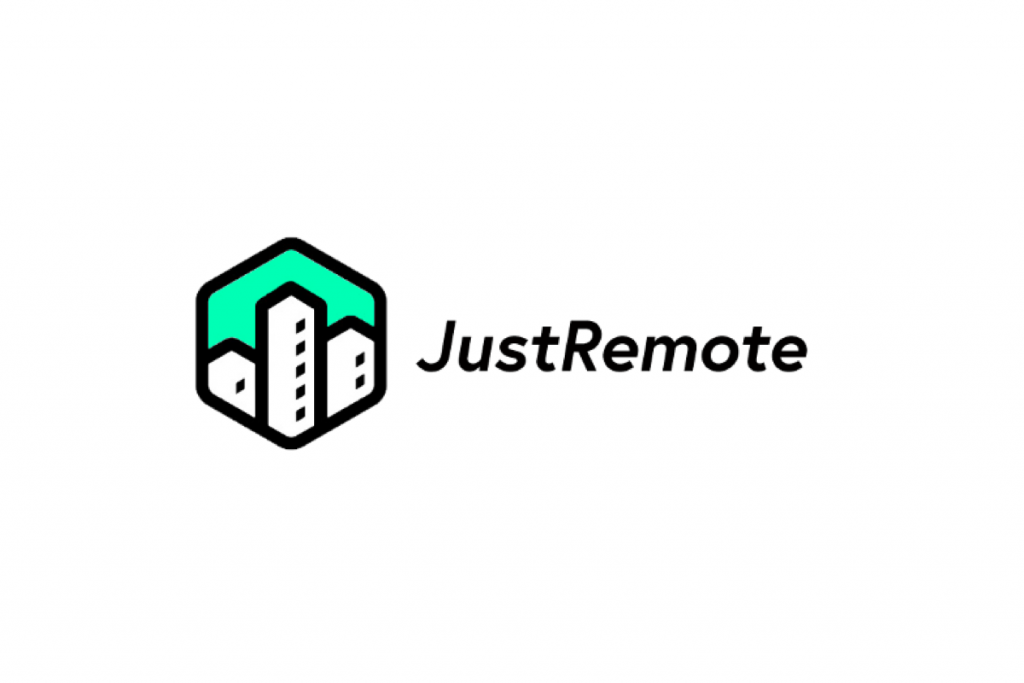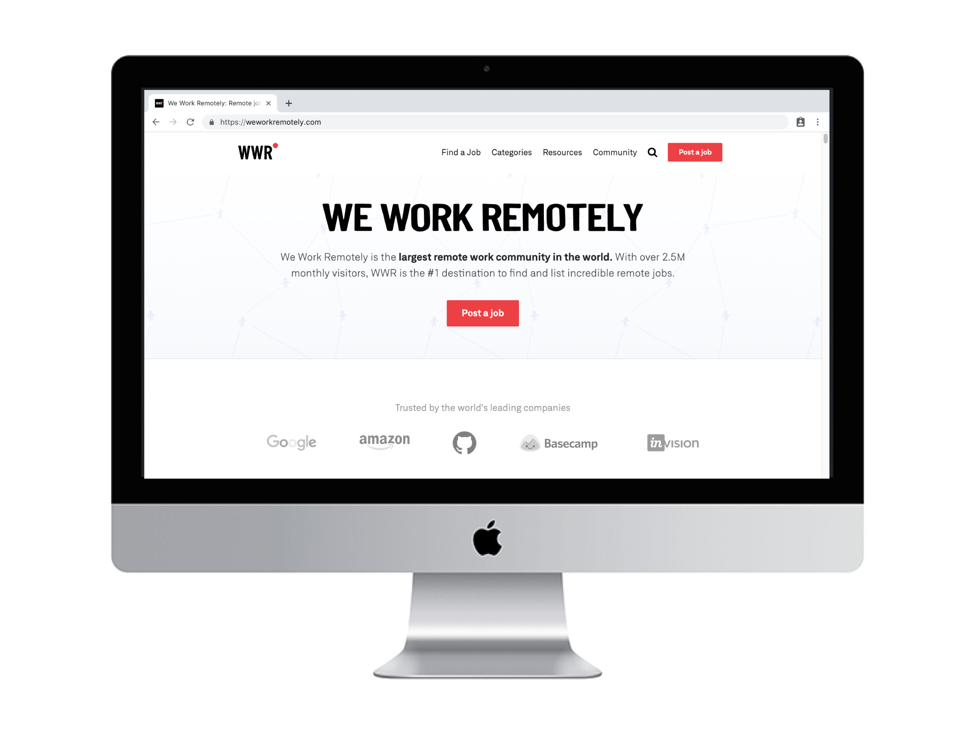Stepping into the Digital Sphere: Tips for Landing Your First Remote Social Media Job
Navigating the world of remote work can feel like a daunting task, especially when looking for your first social media job. With over 50% of all workers projected to be working remotely by 2025, it’s clear that remote work is becoming the new norm in many industries.
This comprehensive guide will walk you through everything from understanding remote jobs to crafting a standout resume and acing your virtual interviews. Get on board with us as we set off on this journey towards landing your dream remote gig!
Key Takeaways
- Remote jobs offer the opportunity to work from anywhere, providing flexibility in work hours and location for better work-life balance.
- Remote job boards such as FlexJobs, We Work Remotely, and Virtual Vocations are valuable resources for finding remote social media jobs.
- Networking on LinkedIn and joining relevant groups can help you connect with professionals in the industry and increase your chances of finding remote social media job opportunities.
Understanding Remote Jobs
Remote jobs offer the opportunity to work from anywhere, but it’s important to weigh the pros and cons and understand the different types of remote teams before deciding if it’s right for you.
The Pros and Cons of Remote Jobs
Remote jobs come with a multitude of benefits but they also have some drawbacks. It is essential to understand both sides to make an informed decision.
| Pros | Cons |
|---|---|
| Flexibility in work hours and location allows for better work-life balance. | Remote jobs may have location restrictions due to client requirements, legal regulations, tax considerations, or the need for occasional travel. |
| Remote work gives access to job opportunities regardless of geographical location or local job market. | There may be feelings of isolation or loneliness due to lack of physical interaction with colleagues. |
| Remote work options can be full-time, part-time, freelance, or contract-based, which enables career exploration and flexibility. | Distractions at home can make it challenging to focus and maintain productivity. |
| Commuting time and costs are significantly reduced or eliminated. | There may be potential difficulties in segregating work life and personal life. |
| Allows for a customizable work environment tailored to individual comfort and productivity. | Communication and collaboration with the team can be more challenging in a remote setup. |
Keep in mind that the advantages and disadvantages of remote work can vary depending on personal circumstances and job roles. It’s important to consider these factors when deciding if remote work is the right choice for you.
Differentiating between Partially vs. Fully Distributed Remote Teams
Partially distributed teams are a hybrid blend of co-located and remote workers. Some team members work in an office, while others enjoy the flexibility of working from anywhere. This model grants some level of location independence without fully committing to a completely virtual environment.
On the other hand, fully distributed teams consist entirely of remote employees spread across different geographical locations. These companies have no physical office space and operate solely via digital platforms like email, Slack or Zoom.
The key advantage here is accessibility; talented individuals can contribute their expertise regardless of where they live, embodying true freedom and diversity in the workforce.
Determining if a Remote Job is Right for You
Evaluate your motivations at work and assess your suitability for remote work to determine if a remote job is the right fit for you.
Evaluating Your Motivations at Work
Identifying what drives you within a professional setting is key in determining the right career move. Dig deep and consider your internal motivations: what prompts you to perform at your best? Are you motivated by recognition, challenges, or maybe the flexibility that remote work brings? Your answers can provide valuable insight into whether a remote social media job aligns with your personal values and career goals.
Notably, those who are intrinsically self-motivated often thrive in remote work environments as these settings require significant autonomy and proactive communication. So take time to understand what truly motivates you at work before launching into a job search for a role which may not fit your motivational needs or skills.
Assessing Your Suitability for Remote Work
Self-assessment plays a critical role in determining your suitability for remote work. Start by taking stock of the necessary skills that remote jobs often require, such as self-motivation, task and time management, proactive communication, and comfort with technology.
Reflect on your past experiences to ascertain if you possess these abilities or need development in certain areas. Analyzing your motivations at work can also offer insights into this decision; some individuals thrive working independently while others might miss the camaraderie of an office setting.
Ensure you also evaluate how well you handle isolation since remote work allows less face-to-face interaction. Likewise, consider if separating your personal life from work tasks presents challenges for you because maintaining a balance becomes increasingly crucial when your home doubles as an office space.
Be honest during this self-evaluation process because it helps align expectations and enhances job satisfaction after securing a position.
How to Find Your First Remote Social Media Job
Utilize remote job boards and network on LinkedIn to increase your chances of finding a remote social media job.
Utilizing Remote Job Boards
Remote job boards are a valuable resource for finding your first remote social media job. Here are some top platforms to help you in your search:
- FlexJobs: This niche job search platform specializes in remote and flexible work opportunities, including remote social media jobs.
- We Work Remotely: As the largest remote work community globally, it attracts over 3 million visitors who are looking for remote job opportunities.
- Virtual Vocations: This job board focuses specifically on telecommuting jobs and offers courses to help you improve your job search and interview skills.
- Dribbble: If you’re a designer, Dribbble is a website that caters to your needs. It not only features a job board but also freelance postings for remote social media projects.
- Fiverr: Fiverr is a platform where you can find small remote social media gigs or jobs that can fit well with your schedule and skills.
- Upwork: With over five million companies using Upwork to hire freelancers, it’s a popular platform for finding remote social media opportunities.

Networking on LinkedIn and Reaching Out to Connections
Networking on LinkedIn is an essential step in finding remote social media job opportunities. It allows you to connect with professionals in the industry and gain insights, advice, and potential job leads. Here are some ways to maximize your networking efforts on LinkedIn:
- Optimize your LinkedIn profile: Make sure your profile showcases your skills, experience, and passion for remote social media work. Use relevant keywords from the job description to increase your visibility in search results.
- Join relevant LinkedIn groups: Find and join groups related to remote work, social media marketing, or specific industries you’re interested in. Participate in discussions, share valuable insights, and connect with professionals who can help you in your job search.
- Engage with content: Like, comment on, and share posts related to remote work or social media marketing. This not only helps build relationships with other professionals but also increases your visibility within the industry.
- Personalize connection requests: When reaching out to connections on LinkedIn, make sure to mention why you’re interested in connecting and how you can add value to their network. Personalized messages are more likely to receive a positive response.
- Express interest in remote social media jobs: In your conversations with connections, express your enthusiasm for remote social media work and let them know that you’re actively seeking opportunities in this field. They may be able to provide referrals or recommendations.

Top Sites to Find Remote Social Media Jobs
Some top sites to find remote social media jobs include FlexJobs, JustRemote, Remote.co, WeWorkRemotely, and Jobspresso.
FlexJobs
FlexJobs is a highly reputable platform for remote job seekers, offering a wide selection of verified and scam-free job listings. With over 200 hours spent daily on verifying job postings, FlexJobs saves users valuable time in their search for remote social media jobs.
They go the extra mile to ensure the quality of their listings, guaranteeing a higher standard compared to other sites. Users can also benefit from personalized job alerts, webinars, and courses offered by FlexJobs, helping them find a job faster and more efficiently.
Many individuals have successfully found legitimate remote social media positions through FlexJobs and appreciate the platform’s dedication in connecting them with reliable opportunities.
JustRemote

JustRemote is a reputable site that specializes in remote job opportunities in the social media field. Accredited by the Better Business Bureau, JustRemote screens all jobs before posting them to ensure legitimacy.
As one of the top sites for finding remote social media jobs, it provides a reliable platform for those seeking flexible work options. With JustRemote, you can confidently browse through various job listings and connect with employers who offer remote positions in social media management and other related roles.
Remote.co
Remote.co is one of the top sites to find remote social media jobs. It offers a wide range of remote job opportunities across different industries. With Remote.co, you can access legitimate remote jobs and connect with employers who value skills like technology proficiency, proactive communication, self-motivation, and effective time management.
Whether you’re looking for full-time or part-time work, Remote.co provides a platform where you can explore various career fields and find your dream remote job. So if you’re ready to join the agile workforce and work from anywhere, check out Remote.co for exciting remote job opportunities in the field of social media.
WeWorkRemotely
WeWorkRemotely is a leading job board that focuses on remote positions specifically in software engineering and design. It is one of the top sites to find remote social media jobs, offering an array of job opportunities in various categories, including marketing.
WeWorkRemotely not only provides flexibility for work-life balance but also allows individuals to explore different career options. When applying through WeWorkRemotely, it’s crucial to research the companies that offer remote jobs to ensure a good fit with your skills and preferences.

Jobspresso
Jobspresso is one of the top sites to find remote social media jobs. With a user-friendly interface and extensive job listings, Jobspresso is a go-to resource for those seeking remote work in the field of social media.
This platform offers opportunities in various categories, allowing individuals to choose from a range of positions that align with their skills and interests. When searching for remote jobs on Jobspresso, it is important to highlight relevant experience and showcase skills such as digital marketing, content creation, and social media management.
By utilizing this site’s resources, job seekers can increase their chances of finding their ideal remote social media position.
Making Your Resume Stand Out
- Highlight your remote skills and experiences, even if you have not worked remotely before.
- Clearly state your remote work preferences in your objective or summary section.
- Tailor your resume to match the specific job description and requirements.
- Use action verbs to showcase your accomplishments and responsibilities in previous roles.
- Include any relevant certifications or training related to remote work or the industry you’re applying for.
- Quantify your achievements with numbers or percentages whenever possible.
- Keep your resume concise and focused, emphasizing the most relevant information.
- Use a clean and professional format that is easy to read.
- Proofread carefully for any grammar or spelling mistakes.
Tailoring Your Application to the Role Description
To increase your chances of securing a remote social media job, it is crucial to tailor your application to the role description. Consider the following tips:
- Highlight relevant experience: Showcase your past experience in social media management or marketing, emphasizing accomplishments and results achieved.
- Customize your resume: Tailor your resume to include keywords and skills mentioned in the job description. This will demonstrate that you have the specific qualifications they are looking for.
- Craft a compelling cover letter: Use the cover letter to explain how your skills and experience align with the requirements of the role. Show enthusiasm for remote work and highlight any related achievements or projects.
- Research the company: Take the time to understand the company’s values, culture, and target audience. Incorporate this knowledge into your application by addressing how you can contribute to their goals.
- Provide relevant examples: Use specific examples from your previous work or personal projects that demonstrate your ability to handle social media tasks remotely.
Applying to a Remote Job with No Prior Remote Work Experience
Change your approach in applying to remote jobs if you have no prior remote work experience.
Changing One Variable in Your Application Approach
When applying for remote jobs without prior remote work experience, a small adjustment can make a big difference in your success. Here are some key changes you can make to improve your chances:
- Highlight relevant skills: Emphasize skills that are important for remote work, such as proficiency with technology, self-motivation, proactive communication, and effective task and time management.
- Showcase remote experiences: Even if you haven’t worked remotely before, highlight any experiences or projects that demonstrate your ability to work independently and manage tasks effectively from a distance.
- Tailor your application materials: Research the company and position to understand their specific needs and values. Customize your resume, cover letter, and portfolio to showcase how your skills align with their requirements.
- Use social proof: Include testimonials or references that speak to your abilities as a remote worker. This can help build trust with potential employers who may be hesitant about hiring someone without remote experience.
- Demonstrate adaptability: Show that you are comfortable working in different environments and can quickly adapt to new tools or technologies commonly used in remote work settings.
Crushing the Remote Interview Process
Preparing for remote interviews is crucial in landing your first remote social media job. Learn how to stand out, send thank-you notes, and follow up politely if no response is received.
Read on to discover the secrets of acing the remote interview process.
Preparing for Remote Interviews
Preparing for remote interviews is crucial to increase your chances of landing a remote social media job. Here are some key steps to help you get ready:
- Research the company: Gain a thorough understanding of the organization, its values, and its culture. This will allow you to tailor your responses during the interview.
- Review the job description: Take note of the required skills and qualifications mentioned in the job posting. Prepare examples that demonstrate how your experience aligns with these requirements.
- Practice common interview questions: Prepare concise yet detailed responses for common interview questions related to social media strategies, campaign management, content creation, and analytics.
- Test your technology: Ensure that your internet connection is stable and that any necessary video conferencing software, such as Zoom or Skype, is installed and working properly.
- Set up a professional workspace: Find a quiet and well-lit area where you can conduct the interview without any distractions or interruptions.
- Dress professionally: Even though you may be interviewing from home, dressing professionally will help you get into the right mindset and make a positive impression on potential employers.
- Showcase your remote skills: Highlight specific examples of how you have successfully worked remotely in the past, such as effectively managing projects or collaborating with team members across different time zones.
- Prepare questions for the interviewer: Show your interest by asking thoughtful questions about the company’s remote work policies, team dynamics, and future growth opportunities
Sending Thank-You Notes to Recruiters and Interviewers
Sending thank-you notes to recruiters and interviewers is an important step in the remote job interview process. By taking the time to express gratitude for the interview and show appreciation for the opportunity, you can set yourself apart from other candidates.
These notes can be sent via email or handwritten, and it’s crucial to personalize each one to the recipient. In your thank-you note, highlight key points discussed during the interview and reiterate your interest in the position.
By doing so, you not only strengthen your relationship with the recruiter or interviewer but also leave a positive impression that could make a difference in their decision-making process.
Following Up Politely if No Response is Received
If you haven’t heard back from a potential employer after submitting an application or completing an interview, it’s important to follow up politely. This demonstrates good communication skills and shows your continued interest in the position.
Wait at least one week before sending a polite and concise email to inquire about the status of the hiring process and when a decision is expected to be made. Following up can help keep your application top of mind for employers and increase the chances of receiving a response.
Accepting Your Remote Job Offer
Understanding the Terms of the Offer and navigating the transition to remote work are essential when accepting a remote job offer.
Understanding the Terms of the Offer
Remote job offers often come with specific terms and conditions that you need to understand before accepting. From compensation to work responsibilities, it’s essential to carefully review the details of the offer.
Remote job opportunities can be full-time, part-time, freelance, or contract-based, so make sure you know what type of arrangement you are getting into. Additionally, consider any location requirements or restrictions if applicable.
Take note of the specific tasks and responsibilities outlined in the job description as they will determine your day-to-day work. Lastly, pay attention to compensation details such as salary, benefits, and any additional perks offered by the employer.
Navigating the Transition to Remote Work
Transitioning to remote work can be an adjustment, but with the right approach, you can navigate this change successfully. Here are some tips to help you make a smooth transition:
- Set up a dedicated workspace at home: Creating a designated area for work will help you separate your professional and personal life.
- Establish a routine: Stick to a regular schedule that aligns with your remote work hours. This will help maintain productivity and ensure work-life balance.
- Communicate effectively with colleagues: Utilize collaboration tools like Slack or Zoom to stay connected and engaged with your team members.
- Take advantage of remote collaboration software: Platforms like Asana can help you manage tasks, deadlines, and projects efficiently.
- Maintain proactive communication: Remote work requires clear and timely communication. Be responsive, ask questions when needed, and keep your team informed about your progress.
- Stay organized: Use digital tools or apps to stay on top of deadlines, prioritize tasks, and track progress effectively.
- Prioritize self-care: Working remotely can blur boundaries between work and personal life, so it’s important to take breaks, exercise regularly, and practice self-care to avoid burnout.
- Seek support from remote work communities: Join online communities or forums where you can connect with other remote workers for advice and support.
Bonus Tip: Working and Traveling Remotely
Maintain a healthy work-life balance while traveling by creating a dedicated workspace, establishing a routine, and utilizing technology tools to stay connected with your remote team.
Balancing Work and Travel in a Remote Role
Remote work offers individuals the opportunity to have a flexible lifestyle and balance their work with travel. With a remote role, you have the freedom to work from anywhere as long as you have an internet connection.
This means that you can explore new destinations while still fulfilling your job responsibilities. Whether it’s working from a beachside café or in the mountains, remote work allows you to create your own office space wherever you go.
Keep in mind that while traveling, it’s important to establish a routine and set boundaries between work and leisure time to maintain productivity and achieve a healthy work-life balance.
Conclusion
Finding your first remote social media job is an achievable goal with the right strategies in place. By utilizing remote job boards, networking on platforms like LinkedIn, and tailoring your application materials to stand out, you can increase your chances of landing a remote position.
Remember to emphasize your relevant skills and experiences in the remote work field, showcase proactive communication skills, and stay vigilant against potential job scams. With dedication and persistence, you’ll be well on your way to securing a rewarding remote social media job.

